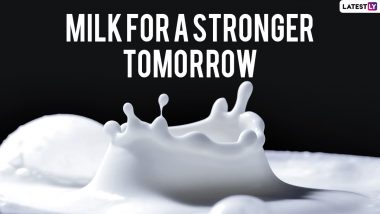Picking a packet of milk has new meaning now since cow's milk is not the only choice. With a plethora of options, it can be a little tough to figure out what you should be pouring over your morning cereal. While choosing a type of milk is a personal choice, and unless you are lactose intolerant, there is no prescription on which milk should you start sipping. From coconut to almond, how do you know which is the most nutritious choice for you? We give you a rundown of the nutrition quotient of every milk stocked on the shelf.
1. Whole Dairy Milk
Whole dairy milk is rich in calcium and vitamins A and D, great for your bone health. Yes, it has rich fat content, but the fat in whole dairy milk makes it easier for the nutrients to get absorbed in the body. A cup of whole dairy milk can provide you with 150 calories in a cup, so you may not want to consume it if you are watching your calories. Cow Milk Vs Buffalo Milk- Which one is Better?
2. Skim Dairy Milk
Skim milk has obvious benefits than its fattier counterparts with only 100 calories in one cup. A cup of skim milk will deliver 8g of protein and 30 percent of your daily calcium dosage. But if you are watching your waistline, it would be worth paying attention to the 12g of carbs in one cup of skim milk.
3. Almond milk
The lactose-free almond milk can be extremely kind to your waistline with one cup of milk containing only 30 calories. Besides, it is also a good source of antioxidants and vitamin E. If you are drinking almond milk, you will lose out on the protein with only 1g in one cup. From Stronger Bones to Weight Loss, Here Are the Health Benefits of Cow Milk
4. Cashew Milk
Cashew milk contains 50 percent more calcium than cow's milk without all the saturated fat. Just like almond milk, it contains negligible amounts of protein, so plan the rest of your meals accordingly. It is a little sweeter and creamier than almond milk, so if you are not into the nutty flavour of almond milk, this may be a better choice.
5. Soy Milk
Soy milk is lactose-free and offers more calcium per cup than cow's milk. Plus, it packs in high doses of iron, B vitamins, protein and fibre. You must have heard about the controversial history of soy milk and breast cancer, so if your old cancer connection is messing with your peace of mind, you can try other lactose-free alternatives. Vegan Milk Options: From Coconut to Almond, Here Are 5 Types of Non-Dairy Milk For Lactose Intolerant People And Vegans
6. Coconut Milk
Coconut milk not only packs a lot of flavours but is also rich in calcium, vitamin B and vitamin D. When you are picking coconut milk, make sure that you read the label because a lot of them contains added sugars. Coconut also naturally contain more saturated fat than nut milk.
7. Rice Milk
If your stomach is sensitive, rice milk can be an excellent hypoallergenic option. It is easier to digest when compared to other nut-based milk. However, it provides around 25g of carbs per serving, so you may want to skip it if you are watching your weight. Can You Have Milk on a Keto Diet? The Truth About Dairy, Ketosis and Ketogenic Diet
8. Camel Milk
In addition to being low in saturated fat than other dairy milk options, camel milk can be an excellent probiotic. It is also a natural source of blood sugar-regulating insulin, but it is a little higher on the calorie count with 107 calories in a cup.
A lot of these milk has to do more with taste and flavour than the nutrient content. That said, these slight nutritional difference might sway you one way or another.
(The above story first appeared on LatestLY on Jan 11, 2020 08:30 AM IST. For more news and updates on politics, world, sports, entertainment and lifestyle, log on to our website latestly.com).













 Quickly
Quickly





















